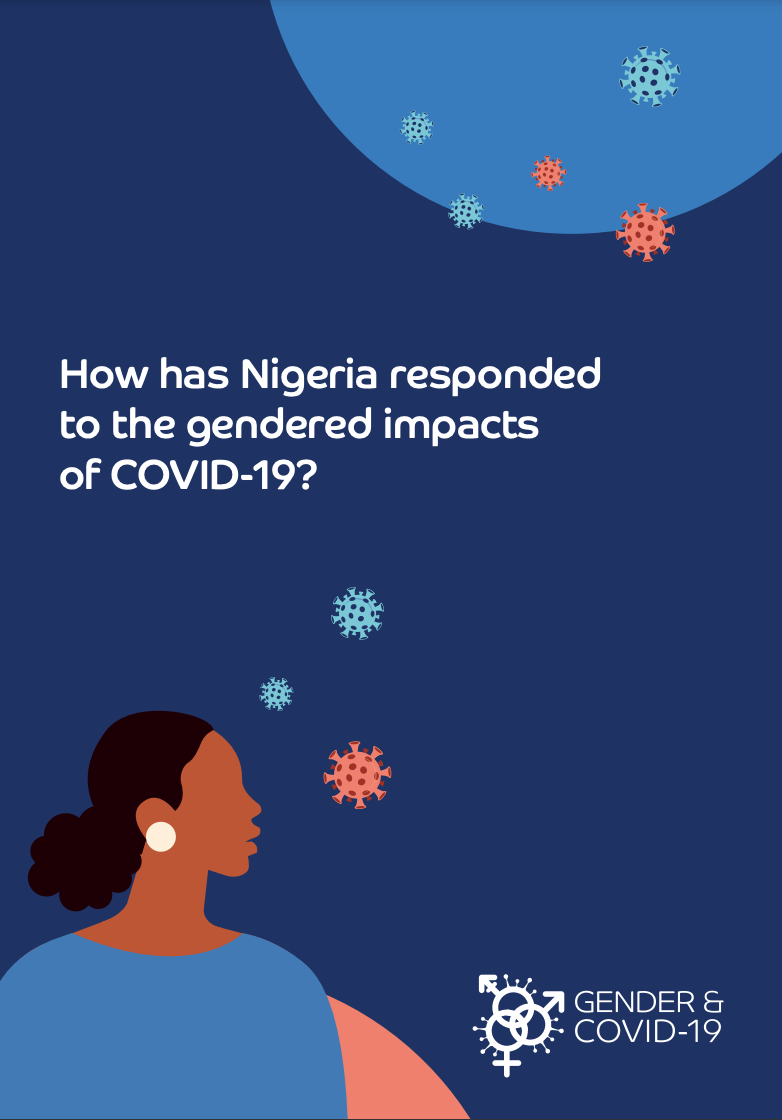
The COVID-19 pandemic has disproportionately impacted women and vulnerable groups, as well as compounded pre-existing gender inequalities. As a result, measures to mitigate the gendered impacts of COVID-19 must be part of pandemic response and recovery plans. This report analyzes the gender responsiveness of the Nigeria COVID-19 plan by asking:
- How has the COVID-19 pandemic impacted women and vulnerable groups in Nigeria?
- What measures were included in Nigeria’s National COVID-19 Pandemic Multi-Sectoral Response Plan (the Plan) to specifically address the gendered impacts of COVID-19?
- What measures have been taken to address and respond to the gendered impacts of COVID-19 in Nigeria?
- What else can be done to ensure a gender-responsive pandemic plan in Nigeria?
This report covers both the primary and secondary gendered impacts of COVID-19. Primary impacts refer to immediate, direct impacts, such as COVID-19 infections, vaccinations, deaths, and related illnesses; while secondary impacts refer to longer-term social, economic, and non-COVID-19 health impacts. In each section of the report, we outline the measures taken by the Nigerian government and recommend how to strengthen these interventions by introducing a gender lens.
Our analysis demonstrates that federal policy is out of step with the gendered impacts of the pandemic and on the ground realities. For example:
• Women reported difficulties obtaining government palliatives or aid. According to a July 2020 survey of 5,813 women from nine States and the Federal Capital Territory, 75.8% did not receive any assistance, while 15.9% received food items, 3.7% received facemasks and sanitizers, and 1.2% received cash.
• The same survey also showed that 60% of women were “fully engaged” in childcare. Men have not stepped up to share the burden of care work and have instead focused on returning to paid work.
• In a survey of 105 health care workers (54.3% female) at three COVID-19 isolation and treatment centers in Lagos State from
20 April to 20 June 2020, 16.2% had depression and 15.2% had anxiety. Levels of depression and anxiety were highest among nurses, compared to physicians and other health care workers.
• A survey of 755 respondents in Lagos, Ogun, and Abuja from 25 April to 4 May 2020 found that the mental health toll of the pandemic may be exacerbated by domestic violence Respondents who experienced emotional abuse (15% of respondents) were almost two times more likely to develop depression and 1.68 times more likely to develop posttraumatic stress disorder.
• According to CARE International program data of 201 family planning visits, contraception use among adolescent girls dropped by 66% from January to May 2020, compared to 46% for adult women.
• From March to April 2020, reports of gender-based violence nearly quadrupled in Lagos State, Ogun State, and the Federal Capital Territory, which were under full lockdown. Several female students were also raped and murdered during the pandemic, which ignited protests across the country.
• In a 2020 CARE International survey of 308 adolescent girls in Nigeria, 31% of girls reported that they did not attend school in the last year. Their reasons for not attending school included lack of funds to pay for school fees and supplies (34%), school closures (33%), and needing to work to support their families (8%).
• Women comprised only two out of twelve members (17%) of the Presidential Task Force on COVID-198. In addition, women’s participation in decision-making at the community level has also dropped during the pandemic. According to a July 2020 survey of 5,813 women from nine States and the Federal Capital Territory, only 21.3% of women participated in community decision-making during the pandemic, compared to 77.6% before the pandemic.
How has Nigeria responded to the gendered impacts of COVID-19?





